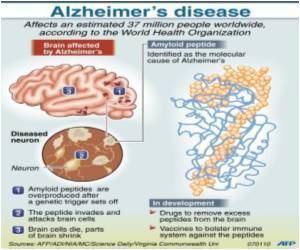US researchers seem to have zeroed in on a neural pathway, the perforant, as a key to memory. And so degradation of the pathway could signal problems in storing information.

According to a Johns Hopkins neuroscientist, however, the real trouble is that our aging brains are unable to process this information as “new” because the brain pathways leading to the hippocampus — the area of the brain that stores memories — become degraded over time. As a result, our brains cannot accurately “file” new information (like where we left the car that particular morning), and confusion results.
“Our research uses brain imaging techniques that investigate both the brain’s functional and structural integrity to demonstrate that age is associated with a reduction in the hippocampus’s ability to do its job, and this is related to the reduced input it is getting from the rest of the brain,” said Michael Yassa, assistant professor of psychological and brain sciences in Johns Hopkins’ Krieger School of Arts and Sciences. “As we get older, we are much more susceptible to ‘interference’ from older memories than we are when we are younger.”
In other words, when faced with an experience similar to what it has encountered before, such as parking the car, our brain tends to recall old information it already has stored instead of filing new information and being able to retrieve that. The result? You can’t find your car immediately and find yourself wandering the parking lot.
“Maybe this is also why we tend to reminisce so much more as we get older: because it is easier to recall old memories than make new ones,” Yassa speculated.
The study appears in a recent online edition of the Proceedings of the National Academy of Sciences and is available at
Advertisement
Some of the pictures were similar but not identical, and others were markedly different. The team used functional MRI to watch the hippocampus when participants saw items that were exactly the same or slightly different to ascertain how this region of the brain classified that item: as familiar or not.
Advertisement
Later, the participants viewed a series of completely new pictures (all different) and again were asked to classify them as either “indoor” or “outdoor.” A few minutes later, the researchers presented the participants with the new set of pictures and asked whether each item was “old,” “new” or “similar.”
“The ‘similar’ response was the critical response for us, because it let us know that participants could distinguish between similar items and knew that they’re not identical to the ones they’d seen before,” Yassa said. “We found that older adults tended to have fewer ‘similar’ responses and more ‘old’ responses instead, indicating that they could not distinguish between similar items.”
Yassa said that this inability among older adults to recognize information as “similar” to something they had seen recently is linked to what is known as the “perforant pathway,” which directs input from the rest of the brain into the hippocampus. The more degraded the pathway, the less likely the hippocampus is to store similar memories as distinct from old memories.
“We are now closer to understanding some of the mechanisms that underlie memory loss with increasing age,” Yassa said. “These results have possible practical ramifications in the treatment of Alzheimer’s disease, because the hippocampus is one of the places that deteriorate very early in the course of that disease.”
The team’s next step would be to conduct clinical trials in early Alzheimer’s disease patients using the mechanisms that they have isolated as a way to measure the efficacy of therapeutic medications.
“Basically, we will now be able to investigate the effect of a drug on hippocampal function and pathway integrity,” he said. “If the drug slows down pathway degradation and hippocampal dysfunction, it’s possible that it could delay the onset of Alzheimer’s by five to 10 years, which may be enough for a large proportion of older adults to not get the disease at all. This would be a huge breakthrough in the field.”
Source-Medindia













